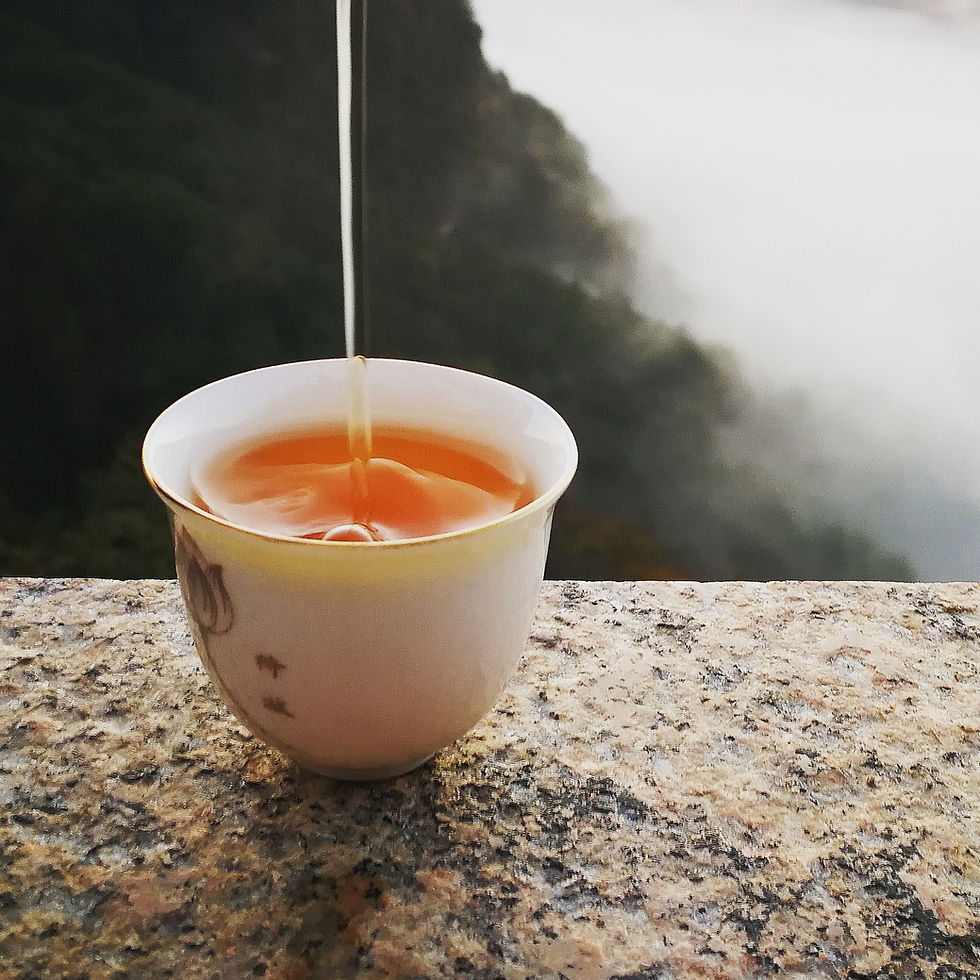Blog 116: Is Tea Calming or Stimulating?
- Valley Brook Tea

- Apr 29, 2019
- 3 min read
When I visited London in 2011, my hotel prepared quite a lot tea for me. Knowing my tea business background, the hotel even provided me a selection of teaware. Interestingly, during my stay, all tea and teaware would magically disappear after dinner and reappear after lunch.
When I asked the hotel if they could keep the tea set in my room for the night, they were a little surprised because most of their customers wouldn’t drink any tea in the evening due to the fear of insomnia.

Does drinking tea at night really lead to insomnia? Not really. It depends on what tea we drink and how tea is prepared. Also, our tolerance of substances in tea affects us, too. Heavy tea or coffee drinkers rarely have the problem of late night tea-drinking.
Moreover, among all tea categories, there’re many tea products can be enjoyed at night even if you’re not a regular tea drinker.
However, there is still a general belief that “drinking tea will keep you awake”. Many people also treat tea as a coffee alternative at work.

Today, let’s address this misconception and discuss the stimulating part and the calming part of tea.
Chinese herbal medicine philosophy considers tea to be both “calming” and “stimulating”. On the surface, these 2 effects are contradictory. How can something be calming and stimulating at the same time?
To answer this question, we must understand 3 major substances that constitute the flavor of tea: caffeine, tea polyphenols and theanine.
Specifically, caffeine represents the “bitterness”. Tea polyphenols represent the “dryness/numbness”. Theanine represents the “freshness”. The content and the ratio of these substances decide the nature of a tea.

The stimulating part of tea
The stimulating effect of tea is the direct result of caffeine. The most obvious mouthfeel of caffeine is bitter and obscure. Although different tea has different levels of caffeine content, the amount of caffeine in tea is largely decided by the amount of time tea leaves steeped in water. Longer the steeping time, higher the caffeine content.
When we oversteep tea leaves, the caffeine level skyrockets and makes the tea too bitter to drink. This is why most over-steeped, low-quality tea often requires sugar and honey.
If you want to stay awake, making a tea stronger is helpful. But from a healthy diet point of view, we highly recommend NOT to drink over-steeped tea. Over-steeped tea is more likely to cause stomachache and tachycardia.
Also, the effect of caffeine is short-lived. The caffeine in tea starts to stimulate within an hour of consumption, and it depletes in 3 to 4 hours.

The calming part of tea
Amino acids and fragrance substances in tea can calm us down. In late night, a calming tea can help us sleep better.
Theanine’s calming effect is the long-term result of tea-drinking. The higher theanine content can effectively suppress caffeine’s stimulation in our nerve system.
If you want your tea to be calming, a tea with higher theanine content is definitely the way to go. Different tea categories have various theanine levels. In general, the level of theanine drops when fermentation level increases. Therefore, white tea has the highest theanine level and dark tea (e.g. Puer tea) has the lowest level. (Dark tea has the lowest theanine level because the “post-fermentation” tea-making of dark tea destroys most theanine contents.)

Finally, how we prepare a tea often decides whether a tea leans toward the calming side or the stimulating side.
The misconception that tea is always stimulating is generally the result of drinking low quality teas. Low quality teas need more steeping time to produce a taste; the longer steeping time extracts too much caffeine content into the tea soup; the higher caffeine level makes a tea “stimulating”. After years of bad tea-drinking habits, the belief that “tea is stimulating” becomes a false common sense.
In reality, some teas are stimulating, and some are calming. We hope this blog can help you better understand the nature of tea.
As always, if you have questions or suggestions, please leave a comment, tweet us @valleybrooktea or email the author directly at zhang@valleybrooktea.com. Please also follow us on Instagram @valleybrooktea and join our mail list to get our daily tea updates and our latest promotions!
This is a Valley Brook Tea original blog. All rights reserved.




Kaiser OTC benefits provide members with discounts on over-the-counter medications, vitamins, and health essentials, promoting better health management and cost-effective wellness solutions.
Obituaries near me help you find recent death notices, providing information about funeral services, memorials, and tributes for loved ones in your area.
is traveluro legit? Many users have had mixed experiences with the platform, so it's important to read reviews and verify deals before booking.